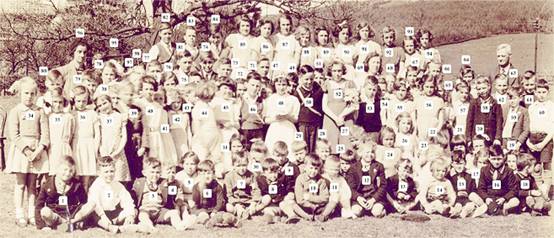
An Interview with 3 Evacuees from Hull
previous article | up | next article
Dennis: Just at the other side of Jebsons’ there was an orchard and we used to go scrumping there.
Margaret: We used to go crab appling. We had a lot of freedom - we could go just where we liked. We used to walk miles.
Dennis: There was someone down below us who used to boil potatoes for the pigs. He used to let you have some, like. There was a family at the bottom of the village who used to go off in a gipsy caravan every summer.
Billy: They had a caravan parked at the back.
Mike: That would have been the Farrows at No 24.
[Information provided by Isobel Robson reveals that Bob Farrow (c.1875 – 1964), a horse dealer, bought a gypsy caravan in 1941 for £24, washed it down with hot water and Vim and varnished it, kept it for a month or two to attend a fair and then sold it to Harry Robson, a farmer of Bishop Wilton for £40. Harry later sold it to The Castle Museum in 1957 where it was restored for their collection.]
Billy: I remember Charlie Farrow thumping the schoolmaster, Mr Rhodes. He got annoyed with the schoolmaster who was going to give him the cane and Charlie wrapped it round his neck. Mrs Rhodes made me drink Horlicks and I detested it. She didn’t ask, she told us that she was taking the milk and she was going to make Horlicks and we could all have Horlicks and like it. I detested it.
Margaret: It was only during one winter I believe and then we couldn’t have it anymore.
Billy: There were Wests [Mr & Mrs Frank West] at the bottom of the village on the left hand side as you look down. Also, there was a family called Smith [Mr & Mrs Harry Smith]. Mr Smith was an agricultural labourer and he worked for Beulahs’. Arthur Beulah who I think still lives at Wilton Wold was the baby born when I lived there. He also had a sister called Elizabeth. She was a baby at the time, as well. My Mam helped to deliver one of them. I think it was Arthur. I remember because it was a shocking winter, in 1941. We thought it was great as kids because we couldn’t get to school. We used to go looking for sheep that was buried in the snow. We’d look for the hole in the snow and they had to be dug out. Where Wilton Wold is now you could walk right from the house, across the road, without seeing a hedge or anything. You just saw an occasional telegraph pole and those two big trees stuck up like lollipops. By, it was a bad winter. It lasted weeks. After a few weeks it was getting desperate because my Mam was having a fit about me Dad, being in the army you see. But no post had come through. So she said, would you like to go and try and get the post, Billy? So I said, Yes I’ll go Mam, being big-hearted Bill. I went down the field where Stead’s wood was (it isn’t there anymore, they’ve chopped it all down) and I got to the bottom and I just disappeared, plop, into a ruddy great snowdrift. I went back and that was it, we just had to give it up. There was no chance of getting any post through at all.
Kate: So how long were you at Beulahs’?
Billy: Well, not so long but that winter really sickened Mam and she wanted to go down into the village and Alan was a baby. We went down and we stayed with a Mrs Ware [No 72]. She had a daughter called Kathy and she married a chap called Foster, I think. There was a family that lived further up from Mrs Ware called Smith [Mr & Mrs Frank Smith] and they had two daughters, Selina Smith and the other was smaller, I don’t remember her name.
Kate: It would have been Grace Smith.
[Looking at the photograph of the 1942 May Queen Celebrations, they can identify Arthur King easily but not themselves]





Arthur (holding his cap), Billy (just peeping over), Margaret and Dennis (a bit of a blur)
Kate: Did you know Norman Gibson [front row, extreme left in the photograph]?
Billy: Yes, he was a nice lad. I think he became an engineer on the tugs for the Wilson Line in Joint Dock, you know.
Kate: He’s dead now but we spoke to his sister Avril Gibson, she lives outside Hedon in Preston.
Billy: A lot of us evacuees we used to fight with some of the locals. We often had a go with the Robinsons. Tell you what used to make us laugh - they used to get us knitting at school, do you remember it?
Mike: Was that part of the War Effort, knitting, like for soldiers?
Dennis: No, I don't think so…..balaclavas, we used to knit.
Billy: And bedsocks for ourselves. It was an easy way to keep the class quiet - don't forget the evacuees doubled the size of their school, but they didn't double the number of teachers - they only brought in another one, and at first we were in that classroom at the end on our own, weren't we? They segregated us from the village at first.
Margaret: To begin with we were in that hut, the Men's Institute.
Page 4 of 11
(c) Copyright 2009 Contributors. All rights reserved. |